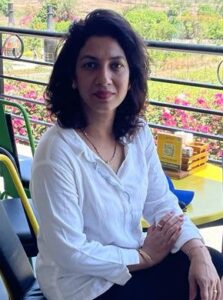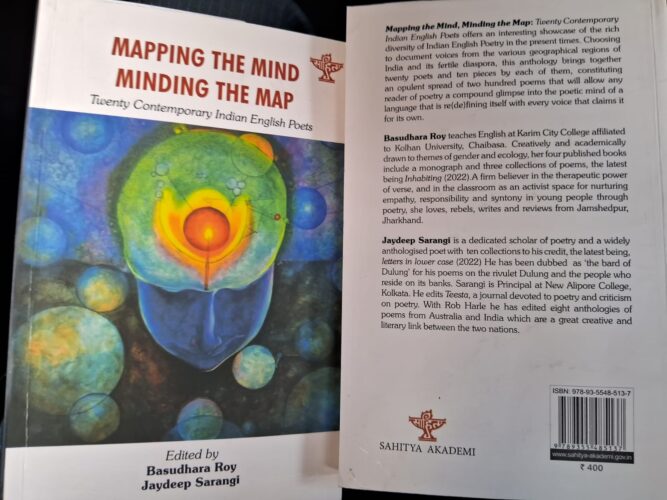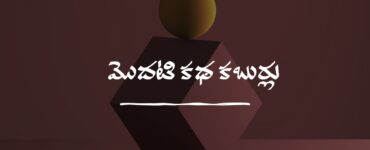 The anthology “Mapping the Mind, Minding the Map,” edited by Jaydeep Sarangi and Basundhara Roy envisioned the triumph of the compendium treasured with new poetic community. The beauty of the anthology lies to maintain the appreciable gender balance while choosing the remarkable voices from all over the four corners of India and from its rich diaspora. The anthology has brought together some of the best Indian English poets with their alluring themes and prominent voices. The aim of this anthology is to showcase fewer poets and more poems with the hope of encouraging readers to embark on their own idiosyncratic and intimate conversation with every poet in the anthology. The twenty poets selected do not predominate men’s voice but has maintained appreciable gender balance.
The anthology “Mapping the Mind, Minding the Map,” edited by Jaydeep Sarangi and Basundhara Roy envisioned the triumph of the compendium treasured with new poetic community. The beauty of the anthology lies to maintain the appreciable gender balance while choosing the remarkable voices from all over the four corners of India and from its rich diaspora. The anthology has brought together some of the best Indian English poets with their alluring themes and prominent voices. The aim of this anthology is to showcase fewer poets and more poems with the hope of encouraging readers to embark on their own idiosyncratic and intimate conversation with every poet in the anthology. The twenty poets selected do not predominate men’s voice but has maintained appreciable gender balance.
Jaydeep Sarangi a well-known Indian poet, critic and academician. The anthology explores different dimensions of human experiences and focused more prominently on how people perceive, interpret and navigate the world around them through their mental and emotional areas. Jaydeep Sarangi holds a Ph.D. and is a Principal & Professor of English of New Alipore College, Kolkata. His academic interests include postcolonial studies, Dalit literature, and translations. He has published extensively in these areas, contributing to both Indian and international journals. As a poet, Dr Sarangi is known for his reflective and evocative verses that explore themes of identity, memory, and social justice. His poetry often delves into the human condition, drawing on his personal experiences and cultural heritage. He has authored several poetry collections, including “A Door Somewhere?” and “From Dulong to Beas: Flow of the Soul.”
Jaydeep Sarangi has edited and co-edited numerous anthologies, bringing together voices from across India and beyond. His anthology “Mapping the Mind, Minding the Map,” co-edited with Basudhara Roy, teaches English to Kolhan University, Chaibasa. She is a reputed poet and a critic. Her latest collection of poems is Inhabiting also wrote Stitching a Home and Moon in My Teacup. Her latest poetry is featured in EPW, The Pine Cone Review, Live Wire, Lucy Writer’s Platform, The Woman Inc, Madras Courier, Berfrois, Yearbook of Indian English Poetry 2020-2021, The Alfa Review and Setu among others.
Basudhara Roy’s work has been widely recognized for its depth, sensitivity, and relevance. She has emerged as a strong voice in contemporary Indian English poetry, especially in the context of feminist discourse. Her contributions to both creative and academic fields have made her an influential figure in Indian literature. Her poetry and critical essays continue to inspire readers and scholars alike, offering nuanced perspectives on the experiences of women and the complexities of Indian society.
The anthology collaborates to bring together a collection of poems and delve into the intricacies of the human mind in a metaphorical manner. The title itself reflects the dual processes of internal exploration (mapping the mind) and the careful consideration of external frameworks or guides (minding the maps) The anthology includes poems from a wide range of poets, each one of them offering a unique perspective on the interplay between internal cognition and external reality. They explore the themes such as identity, memory, culture and the subjective nature of perception. The anthology provides deeper insights into these themes.
The author Jaydeep Sarangi fulfils the objective to provoke thought and reflection on how as individual we construct our understanding of the world. It encourages the readers to consider not just what they think and feel but also how they come to those thoughts and feelings. The anthology contributes to the ongoing discussions about the mental processes, cultural narratives and the different ways in which literature serves as both a mirror and a map of human experience. It is a rich resource for those seeking to read about psychology, philosophy and literature.
The anthology features twenty contemporary Indian English poets. This collection showcases a diverse array of voices and styles, reflecting the rich tapestry of modern Indian poetry. Adil Jussawalla a prominent figure in Indian English poetry, known for his vivid imagery and exploration of personal and national identity. He is a highly regarded Indian poet, essayist, and editor, recognized for his unique voice in Indian English poetry. His work reflects a keen awareness of urban life, colonial history, and the alienation of the modern individual. One of the central themes in Jussawalla’s poetry is the sense of exile both literal and metaphorical. Having spent several years in England and Europe, Jussawalla’s work reflects the dislocation and alienation of being between cultures. He explores the psychological and emotional effects of living away from home and the feeling of not fully belonging to either world. This sense of displacement is often extended to a broader critique of colonialism and its lasting impacts on identity and place.
Mamang Dai is a celebrated Indian poet, novelist, and journalist from Arunachal Pradesh. Her work is deeply rooted in the rich cultural heritage of the northeastern region of India, and her poetry and prose often explore themes of nature, identity, indigenous traditions, and the complexities of modern life. Dai’s writing beautifully merges oral traditions with contemporary concerns, offering a voice that reflects the unique experiences of the tribal communities of Arunachal Pradesh. As a member of the Adi tribe, Mamang Dai is deeply influenced by the oral traditions and myths of her community. Her work is infused with the legends, folklore, and spirituality of the indigenous people of Arunachal Pradesh. She often reflects on the tension between preserving traditional ways of life and the pressures of modernization. Her poems explore how these oral traditions offer wisdom, resilience, and a sense of continuity in the face of change. Dai’s poetry serves as a bridge between the ancient and the modern, highlighting the value of indigenous knowledge.
Keki Daruwalla is known for his powerful voice in Indian English poetry. His work often blends mythology, history, and contemporary issues, reflecting on themes like violence, displacement, political corruption, and the natural world. Daruwalla’s poetry is celebrated for its vivid imagery, sharp language, and engagement with both personal and collective concerns.. Jayant Mahapatra one of India’s leading English poets, is one of India’s most distinguished contemporary poets, writing primarily in English. His poetry is known for its depth, lyricism, and rich imagery, often reflecting the complexities of Indian life, history, and culture. His poetry bridges the gap between Indian culture and modernist literary traditions, offering readers a nuanced and deeply reflective view of the world. In addition to his poetic work, Mahapatra has been a teacher and editor, contributing significantly to Indian literary life. Arundhati Subramaniam a celebrated for her lyrical prowess and deep engagement with themes of love, loss, and social justice. Ashwani Kumar a recognized for his contemplative verses that delve into existential questions and the human condition. Bashabi Fraser her poetry often intertwines personal narratives with broader cultural and political contexts. Bibhu Padhi is known for his innovative use of language and exploration of contemporary societal issues. K. Satchidanandan an acclaimed poet and translator, his work bridges classical traditions with modern sensibilities. K. Srilata her poetry reflects a deep connection with nature and the complexities of human emotions. Lakshmi Kannan’s verses often explore themes of identity, feminism, and social change. Nabina Das’ work address themes of mortality, existence, and the metaphysical aspects of life. Robin S. Ngangom a poet whose work is characterized by its lyrical beauty and engagement with contemporary issues. Sanjukta Dasgupta’s poetry juxtaposes past and present, celebrating resilience and the human spirit. Tabish Khair an acclaimed poet and novelist, his work often explores themes of urban life, identity, and cultural displacement. Usha Akella’s poetry is noted for its emotional depth and exploration of personal and societal narratives. Yogesh Patel known for his dynamic and thought-provoking verses that challenge conventional perspectives.
Many poems in the anthology delve into the poets’ introspections and explorations of their own identities. The poems often examine how individual identity is shaped by cultural, historical, and social contexts. For example, a poem might explore the poet’s personal journey of self-discovery, reflecting on their heritage, language, and the impact of societal expectations.
The theme of memory is central to several poems in the collection. These poems explore how memories both personal and collective shape our understanding of the present and influence our sense of self. The poems often move between past and present, using memory as a map to navigate the complexities of identity and place.
The concept of place both physical and metaphorical is another significant theme in the anthology. The poems explore the idea of belonging and how the places we inhabit or move through influence our identities. Whether it’s a physical landscape, a hometown, or a metaphorical place of comfort or conflict, the poems examine the intricate connections between place and self.
Several poems offer commentary on cultural and social issues, addressing topics such as gender, social justice, and the impact of globalization. These poems often critique societal norms and offer alternative perspectives, inviting readers to reflect on the broader cultural forces that shape individual and collective experiences.
Nature imagery is prevalent in the anthology, with poets using the natural world as a backdrop for exploring human emotions and experiences. The poems often draw parallels between the environment and the human mind, using natural elements as metaphors for emotional states or philosophical ideas.
“Mapping the Mind, Minding the Map” serves as a poetic journey through the landscapes of the human psyche and the external world. Each poet contributes unique perspectives, weaving together themes of identity, memory, culture, and existence. The anthology not only highlights individual voices but also presents a collective narrative that reflects the complexities of contemporary Indian society. The anthology has provided the readers with the opportunity to read the poems of varied poets from different cultures and creed, tradition and environment. The geographical and cultural difference is resembled in their ideas and presentation of themes. So the readers definitely find pleasure and delight in knowing them through their poetry.
*









Add comment